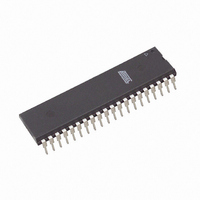ATMEGA16-16PU Atmel, ATMEGA16-16PU Datasheet - Page 115

ATMEGA16-16PU
Manufacturer Part Number
ATMEGA16-16PU
Description
IC AVR MCU 16K 16MHZ 5V 40DIP
Manufacturer
Atmel
Series
AVR® ATmegar
Datasheets
1.ATMEGA16L-8MI.pdf
(26 pages)
2.ATMEGA16L-8MI.pdf
(357 pages)
3.ATMEGA16-16PU.pdf
(358 pages)
4.ATMEGA16-16PU.pdf
(351 pages)
Specifications of ATMEGA16-16PU
Core Processor
AVR
Core Size
8-Bit
Speed
16MHz
Connectivity
I²C, SPI, UART/USART
Peripherals
Brown-out Detect/Reset, POR, PWM, WDT
Number Of I /o
32
Program Memory Size
16KB (8K x 16)
Program Memory Type
FLASH
Eeprom Size
512 x 8
Ram Size
1K x 8
Voltage - Supply (vcc/vdd)
4.5 V ~ 5.5 V
Data Converters
A/D 8x10b
Oscillator Type
Internal
Operating Temperature
-40°C ~ 85°C
Package / Case
40-DIP (0.600", 15.24mm)
Package
40PDIP
Device Core
AVR
Family Name
ATmega
Maximum Speed
16 MHz
Operating Supply Voltage
5 V
Data Bus Width
8 Bit
Number Of Programmable I/os
32
Interface Type
TWI/SPI/USART
On-chip Adc
8-chx10-bit
Number Of Timers
3
Processor Series
ATMEGA16x
Core
AVR8
Data Ram Size
1 KB
Maximum Clock Frequency
16 MHz
Maximum Operating Temperature
+ 85 C
Mounting Style
Through Hole
3rd Party Development Tools
EWAVR, EWAVR-BL
Development Tools By Supplier
ATAVRDRAGON, ATSTK500, ATSTK600, ATAVRISP2, ATAVRONEKIT
Minimum Operating Temperature
- 40 C
A/d Inputs
8-Channel, 10-Bit
Cpu Speed
16 MIPS
Eeprom Memory
512 Bytes
Input Output
32
Interface
JTAG/SPI/UART
Memory Type
Flash
Number Of Bits
8
Package Type
44-pin PDIP
Programmable Memory
16K Bytes
Timers
2-8-bit, 1-16-bit
Voltage, Range
4.5-5.5 V
Controller Family/series
AVR MEGA
No. Of I/o's
32
Eeprom Memory Size
512Byte
Ram Memory Size
1KB
Rohs Compliant
Yes
For Use With
ATSTK600-TQFP44 - STK600 SOCKET/ADAPTER 44-TQFPATSTK600-DIP40 - STK600 SOCKET/ADAPTER 40-PDIP770-1007 - ISP 4PORT ATMEL AVR MCU SPI/JTAGATAVRISP2 - PROGRAMMER AVR IN SYSTEMATJTAGICE2 - AVR ON-CHIP D-BUG SYSTEMATSTK500 - PROGRAMMER AVR STARTER KIT
Lead Free Status / RoHS Status
Lead free / RoHS Compliant
Available stocks
Company
Part Number
Manufacturer
Quantity
Price
Company:
Part Number:
ATMEGA16-16PU
Manufacturer:
Atmel
Quantity:
140
- ATMEGA16L-8MI PDF datasheet
- ATMEGA16L-8MI PDF datasheet #2
- ATMEGA16-16PU PDF datasheet #3
- ATMEGA16-16PU PDF datasheet #4
- Current page: 115 of 358
- Download datasheet (6Mb)
Timer/Counter
Interrupt Mask
Register – TIMSK
Timer/Counter
Interrupt Flag Register
– TIFR
2466R–AVR–06/08
(1)
The Input Capture is updated with the counter (TCNT1) value each time an event occurs on the
ICP1 pin (or optionally on the analog comparator output for Timer/Counter1). The Input Capture
can be used for defining the counter TOP value.
The Input Capture Register is 16-bit in size. To ensure that both the high and Low bytes are read
simultaneously when the CPU accesses these registers, the access is performed using an 8-bit
temporary High Byte Register (TEMP). This temporary register is shared by all the other 16-bit
registers.
Note:
• Bit 5 – TICIE1: Timer/Counter1, Input Capture Interrupt Enable
When this bit is written to one, and the I-flag in the Status Register is set (interrupts globally
enabled), the Timer/Counter1 Input Capture Interrupt is enabled. The corresponding Interrupt
Vector
• Bit 4 – OCIE1A: Timer/Counter1, Output Compare A Match Interrupt Enable
When this bit is written to one, and the I-flag in the Status Register is set (interrupts globally
enabled), the Timer/Counter1 Output Compare A match interrupt is enabled. The corresponding
Interrupt Vector
TIFR, is set.
• Bit 3 – OCIE1B: Timer/Counter1, Output Compare B Match Interrupt Enable
When this bit is written to one, and the I-flag in the Status Register is set (interrupts globally
enabled), the Timer/Counter1 Output Compare B match interrupt is enabled. The corresponding
Interrupt Vector
TIFR, is set.
• Bit 2 – TOIE1: Timer/Counter1, Overflow Interrupt Enable
When this bit is written to one, and the I-flag in the Status Register is set (interrupts globally
enabled), the Timer/Counter1 Overflow Interrupt is enabled. The corresponding Interrupt Vector
(See “Interrupts” on page
Note:
Bit
Read/Write
Initial Value
Bit
Read/Write
Initial Value
(See “Interrupts” on page
1. This register contains interrupt control bits for several Timer/Counters, but only Timer1 bits are
This register contains flag bits for several Timer/Counters, but only Timer1 bits are described in
this section. The remaining bits are described in their respective timer sections.
See “Accessing 16-bit Registers” on page 92.
described in this section. The remaining bits are described in their respective timer sections.
OCIE2
OCF2
R/W
R/W
7
0
7
0
(See “Interrupts” on page
(See “Interrupts” on page
TOIE2
TOV2
R/W
R/W
6
0
6
0
45.) is executed when the TOV1 Flag, located in TIFR, is set.
TICIE1
ICF1
R/W
R/W
5
0
5
0
45.) is executed when the ICF1 Flag, located in TIFR, is set.
OCIE1A
OCF1A
R/W
R/W
4
0
4
0
45.) is executed when the OCF1A Flag, located in
45.) is executed when the OCF1B Flag, located in
OCIE1B
OCF1B
R/W
R/W
3
0
3
0
TOV1
TOIE1
R/W
R/W
2
0
2
0
OCIE0
OCF0
R/W
R/W
1
0
1
0
ATmega16(L)
TOV0
TOIE0
R/W
R/W
0
0
0
0
TIMSK
TIFR
115
Related parts for ATMEGA16-16PU
Image
Part Number
Description
Manufacturer
Datasheet
Request
R

Part Number:
Description:
Manufacturer:
Atmel Corporation
Datasheet:

Part Number:
Description:
IC AVR MCU 16K 16MHZ 5V 44TQFP
Manufacturer:
Atmel
Datasheet:

Part Number:
Description:
IC AVR MCU 16K 16MHZ 5V 44-QFN
Manufacturer:
Atmel
Datasheet:

Part Number:
Description:
MCU AVR 16K FLASH 16MHZ 44-QFN
Manufacturer:
Atmel
Datasheet:

Part Number:
Description:
IC AVR MCU 16K 16MHZ COM 40-DIP
Manufacturer:
Atmel
Datasheet:

Part Number:
Description:
IC AVR MCU 16K 16MHZ COM 44-QFN
Manufacturer:
Atmel
Datasheet:

Part Number:
Description:
IC AVR MCU 16K 16MHZ IND 40-DIP
Manufacturer:
Atmel
Datasheet:

Part Number:
Description:
IC AVR MCU 16K 16MHZ IND 44-QFN
Manufacturer:
Atmel
Datasheet:

Part Number:
Description:
IC AVR MCU 16K 16MHZ IND 44-TQFP
Manufacturer:
Atmel
Datasheet:

Part Number:
Description:
IC MCU 8BIT 16KB FLASH 44TQFP
Manufacturer:
Atmel
Datasheet:

Part Number:
Description:
MCU AVR 16K FLASH 16MHZ 44-TQFP
Manufacturer:
Atmel
Datasheet:

Part Number:
Description:
IC AVR MCU 16K 16MHZ COM 44-TQFP
Manufacturer:
Atmel
Datasheet:

Part Number:
Description:
IC MCU AVR 16K 5V 16MHZ 44-TQFP
Manufacturer:
Atmel
Datasheet:











